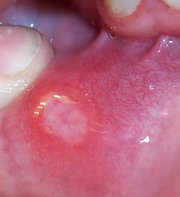Aphthous stomatitis
A mouth ulcer or canker sore is a painful open sore inside the mouth caused by a break in the mucous membrane. The condition is also called aphthous stomatitis or aphthous ulcer, especially if there are multiple or recurring sores. more...
Symptoms
Mouth ulcers often begin with a tingling or burning sensation at the site of the future sore. In a few days they often progress to form a red spot or bump, followed by an open ulcer.
The mouth ulcer appears as a white or yellow oval with an inflamed red border and is on average about 3 mm across, but can be up to 1 cm across and occasionally larger. Sometimes a white circle or halo around the lesion can be observed. The grey, white, or yellow coloured area within the red boundary is due to the formation of layers of fibrin, a protein involved in the clotting of blood. The ulcer, which itself is often extremely painful when agitated, may be accompanied by a painful swelling of the lymph nodes below the jaw, which can be mistaken for toothache.
Mouth ulcers may last anywhere from 1 to 4 weeks, and can cause intense local pain throughout the healing process.
Causes
The exact cause of mouth ulcers is unknown, but factors that appear to provoke them include stress, fatigue, illness, injury from accidental biting, hormonal changes, menstruation, food allergies and deficiencies in vitamin B12, iron and folic acid.
Chinese medicine points to one's diet or emotions as potential causes of such symptoms of 'heat in the mouth'. Greasy/fried foods or 'energetically hot' food (e.g. spicy food, alcohol) may also trigger mouth ulcers. Emotions such as anger, frustration, resentment, or stress can also impede the proper flow of one's energy and create 'heat' in the body, with such manifestations as canker sores, red eyes, sore throats, insomnia or constipation.
In 1982 a previously unknown bacterium, Helicobacter pylori, was discovered to be the cause of stomach ulcers. It is hypothesized that bacteria are at work in mouth ulcers, though the specific organism has not been isolated.
Dental braces can be a cause of mouth ulcers because the wires and hooks could break the mucous membrane inside the mouth. Dental wax can prevent and help heal the ulcers.
A common cause of ulcers is gluten intolerance, in which case consumption of wheat, rye or barley can result in chronic mouth ulcers. If gluten intolerance is the cause, prevention means taking most breads, pastas, cakes, pies, cookies, scones, biscuits, beers etc. out of the diet and substituting gluten-free varieties where available. Artificial sugars, such as those found in diet cola and sugarless gum have been reported as causes of mouth ulcers as well.
Other disorders can cause mouth ulcers, including oral thrush, leukoplakia, gingivostomatitis and oral lichen planus. Mouth ulcers are also associated with ulcerative colitis, Crohn's disease, coeliac disease (gluten sensitivity), bullous pemphigoid, and Behçet's disease. Chemotherapy is a common cause of mouth ulcers. The treatment depends on the cause.
Read more at Wikipedia.org



